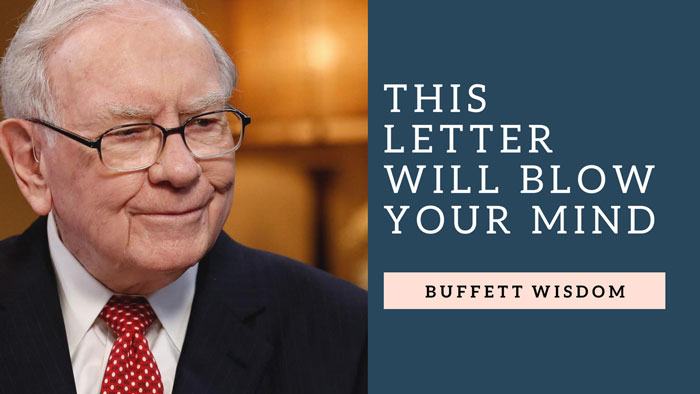This Buffett shareholder letter will blow your mind

I was on the train the other day reading a Warren Buffett’s shareholder letter.
It’s a 23-page report and towards the end, you get the typical humble Buffett-style “Some thoughts about investing”.
Whaaaaat? Some thoughts about investing? Are you kidding me, Buffett?
That was the most mind-blowing piece of writing about investing I’ve ever read!
In this letter, Buffett uses two successful real estate investments that he did long ago to explain his entire philosophy about investing. The first investment was a farm in Nebraska and the second was some real estate property in New York.
I will not repeat the stories, I’ll leave a link to the letter at the end. Here, I want to focus on a few powerful take-home points.
The stuff in bold below is Buffett’s words; the rest is my thoughts.
You don’t need to be an investment expert to achieve satisfactory investment returns. But if you aren’t, you must recognize your limitations and follow a course certain to work reasonably well.
Buffett didn’t know anything about farms. He didn’t know anything about retail property either.
Mmmm…that’s weird. I thought Buffett knows his stuff when it comes to his investments…
He does indeed!
In the case of the farm, he got his son involved who is an expert at farms. His son helped him to calculate an approximate annual return for the farm and Buffett easily spotted that the farm was a good investment.
As to the New York property, he got his friend involved, a real estate high-grade investor with experience in running this kind of properties.
Buffett didn’t go like, oh that looks good, I’ll buy it! I’m Warren Buffett. I’m good.
Buffett says: “Define your circle of competence and stay within that circle.
You don’t have to form an opinion on everything to become a successful investor. You have to spot a handful of opportunities within your circle of competence.
Focus on the future productivity of the asset you are considering. If you don’t feel comfortable making a rough estimate of the asset’s future earnings, just forget it and move on. No one has the ability to evaluate every investment possibility.
Let’s say you want to buy a farm which produces corn. Can you be sure how much corn you’ll get every year for the next twenty years? No.
Can you be absolutely sure what the price of corn will be for the next twenty years? No.
Can you come up with a bottom boundary estimate? Yes.
Are you happy with that extra conservative estimate? Yes.
Then, go ahead buy the farm!
If you’re not happy, simply move on to the next investment opportunity. Do you know how many companies Buffett has to pass every day before he picks a winner to invest his money?
If you focus on the prospective price change of a contemplated purchase, you are speculating. There is nothing improper about that. I know, however, that I am unable to speculate successfully, and I am sceptical of those who claim sustained success at doing so.
I often ask people, why do you want to buy this stock? Because its price it’s gonna go up!
Well, I wish it goes up for you, but when you think like that, you’ve got it wrong right from the start.
A value investor who invests in an active asset such as a company, a farm, a property, focuses on what the asset can generate for him next month, next year, five years from now.
Speculating on the future price of the asset is just like throwing darts. Buffett himself, who has an opportunity to throw a few darts here and there just for fun, doesn’t do it. Do WE wanna throw darts?
Well, actually he can’t play darts himself as money keeps flooding into Berkshire Hathaway and he’s forced to buy and generate returns all the time but anyway, you see what I mean.
People used to take loans to throw darts during the tech bubble in the 90’s. That’s crazy. Don’t play this silly game even if you won once. You can’t be winning forever by tossing a coin.
With my two small investments, I thought only of what the properties would produce and cared not at all about their daily valuations. Games are won by players who focus on the playing field – not by those whose eyes are glued to the scoreboard.
If you’re a coach of a basketball team, you can’t win a game by looking at the scoreboard and wishing that your score will go up. You have to be looking at the court and making good decisions.
If you are an author you can’t be spending your time checking your book sales in all the bookstores of the country on a daily basis. You’d better be improving your books and listening to your readers. Your books are your assets and you wanna be taking care of them if you want to see them sell more.
The same with the farm. If you spend most of your time away from the farm talking to potential buyers, the crops get worse, the soil dries, and in the end, the farm price goes down…
Forming macro opinions or listening to the macro or market predictions of others is a waste of time. Indeed, it is dangerous because it may blur your vision of the facts that are truly important.
This reminds me of people who want to get rich but instead of making an effort to get better at what they do, build new skills, invest in themselves, they focus on what the taxes will be in ten years, they are moaning about their country’s governments, etc.
Just like a stoic philosopher would say, focus on what matters. Focus on what you can control. Estimate what you can estimate and forget the rest. If Buffett is not good at making macro opinions, I don’t think we are any better.
Remember people lose on both sides here. Not only do you end up making false macro opinions and you waste money but you also waste time which you could have spent on the right things.
It should be an enormous advantage for investors in stocks to have those wildly fluctuating valuations placed on their holdings – and for some investors, it is. Owners of stocks, however, too often let the capricious and often irrational behaviour of their fellow owners cause them to behave irrationally as well. Because there is so much chatter about markets, the economy, interest rates, price behaviour of stocks, etc., some investors believe it is important to listen to pundits – and, worse yet, important to consider acting upon their comments. For these investors, liquidity is transformed from the unqualified benefit it should be to a curse.
It should be an advantage to have other investors offering you a different price for your stocks every day, especially when the price goes up and down like crazy.
In a volatile hype, you can take advantage of an irrational buyer who wants too badly your worthless stocks or is ready to dump his valuable stocks for nothing.
But investors do the opposite! When everybody around is behaving irrationally they join the herd too. When this happens, the advantage of liquidity turns to a curse.
A farm produces great crops because its owner takes care of it, puts lots of effort and love into it. If the owner were to change every year, (oh let’s grow potatoes, let’s grow soya beans) things wouldn’t be the same. The cumulative return would be much lower.
It’s the same with people who want to make money online. Every time someone around comes up with a new hot business idea, they dump their previous plan (if a plan…) to pursue a new trend. And then a new trend appears and so on.
The same holds for stocks when you buy a graph rather than a company!
All the above was an appetizer. You can enjoy the main course here. Read from page 17 down.
Buffett. What a brilliant investor, and more importantly, teacher.
[widgets_on_pages id=”WOP Stocks”]

